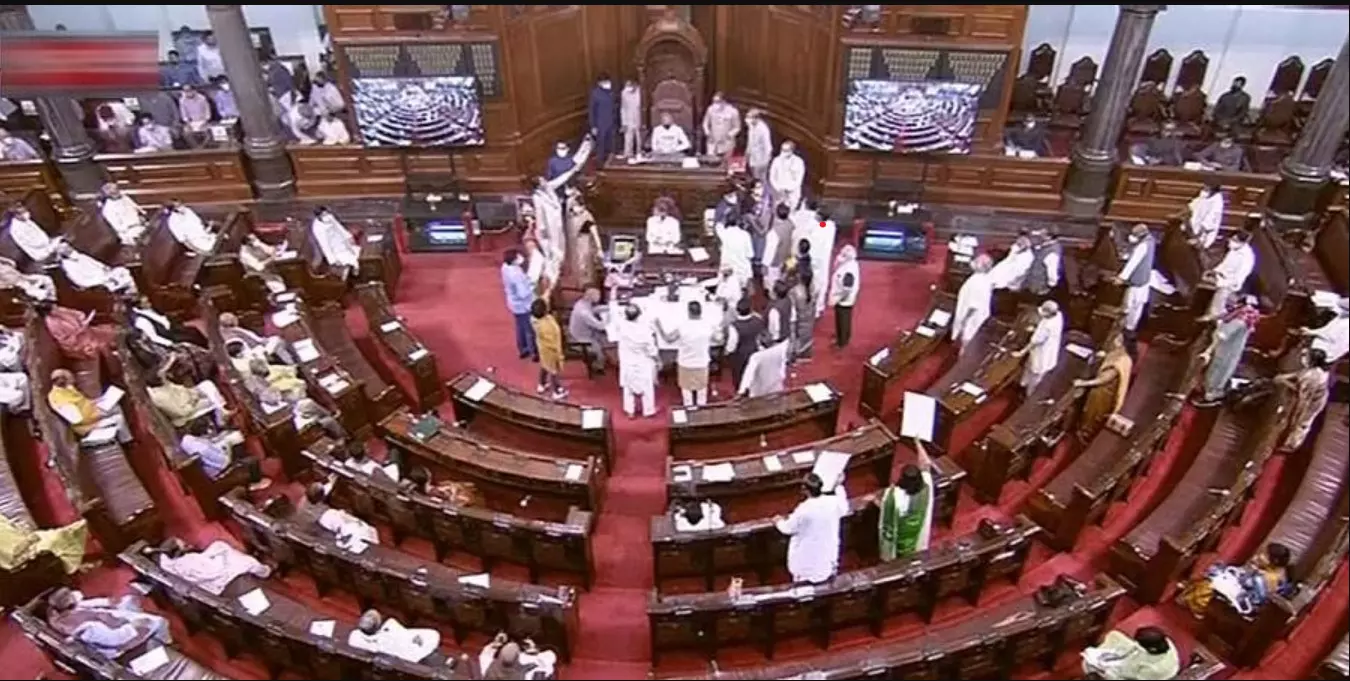Declining decorum

In his valedictory remarks, Speaker Om Birla highlighted that the winter session of the 17th Lok Sabha recorded 74 per cent productivity, functioning for 61 hours and 50 minutes. A total of 18 bills were passed in the Lower House. Om Birla also said that 55 starred questions had been answered orally during the session, and a total number of 265 matters were taken up under Rule 377, apart from the laying down of 1,930 papers on the table. Rajya Sabha Chairman Jagdeep Dhankar also highlighted that 17 bills were passed in the Upper House. The House worked for 65 hours, addressed 2,300 questions, and laid down 4,300 papers on the table — recording a productivity of 79 per cent. However, much before these Parliament leaders, a wise man named Mark Twain had observed: “There are three kinds of lies — Lies, Damned Lies, and Statistics.” The truth is as clear as day: the recently concluded winter session of the Parliament will be notoriously remembered as one of the most anarchic and chaotic sessions of all. At the outset of the session, 37 bills were pending. During the session, 10 more bills were introduced — taking the overall number of bills to 47. Of the overall number of bills, 17 were passed and four were withdrawn — leaving 26 bills pending at the end of the session. All the 10 bills that were introduced during the session were passed and, undesirably, none of those were referred to Parliamentary committees. Parliamentary committees serve as indispensable instruments for scrutinising legislation, overseeing government functioning, and ensuring accountability. These committees facilitate in-depth examination and analysis of various issues, policies, and programmes. Additionally, parliamentary committees act as a check on the executive branch, and through their investigative and advisory roles, ensure transparency, efficiency, and effectiveness of the Indian parliamentary system. It is disheartening to note that over the last couple of years, the role of parliamentary committees has been shrinking. The proportion of bills referred to committees has drastically decreased from 71 per cent during the 15th Lok Sabha to 16 per cent during the 17th Lok Sabha. As per an analysis by PRS Legislative, the time spent on bill discussion during the 17th Lok Sabha was on a decline. During the entire Lok Sabha, 24 bills in the Lower House were discussed for more than four hours while 86 bills were discussed for less than two hours; the corresponding figures for Rajya Sabha were 17 and 103, respectively. The number of members participating in Bill discussions during the 17th Lok Sabha have also not been very encouraging. In Lok Sabha, only 16 bills were discussed by more than 30 members while 68 bills were discussed by less than 10 members; the corresponding figures for Rajya Sabha were 11 and 66, respectively. The in-general decline in quality and quantity of debates in the Parliament were accompanied by several alarming and unprecedented happenings. Foremost among those was the record suspension of 146 MPs during the winter session. Between December 14 and 21, 100 MPs were suspended from Lok Sabha, and 46 from Rajya Sabha — accounting for 19 per cent of the strength of each House. This is the highest number of suspensions in any Lok Sabha term so far. Before the 15th Lok Sabha, large-scale suspension of MPs had been negligible; except for 8th and 3rd Lok Sabha — when 66 and 26 MPs were suspended in the Lower House — such instances were nearly absent. In an extremely undesirable and unethical scenario, almost half of the principle opposition was wiped away before the passage of crucial legislation — paving the way for an approach that could be justly termed “bulldozing”. Ostensibly, the reason behind a large number of suspensions was the widespread protest demanding accountability regarding a serious security breach wherein two intruders jumped into the House with smoke canisters — echoing the lethal 2001 Parliament attack on its 22nd anniversary. Parliamentary bias was also glaringly visible as a TMC MP was expelled on grounds of ethical misconduct, on charges that were serious but disproportionately blown out of proportion. The government’s silent subversion of the security breach incident was starkly contrasted by a fuss over Vice President Jagdeep Dhankar’s mimicry — diverting public attention from more serious matters. The persistent decline in the decorum and efficacy of the Parliament, visible during the winter session, is a collective failure for both the opposition and the government. Parliament’s sanctity as an institution of popular representation should not be overshadowed by petty politics. All stakeholders must understand the gravity of the issue and restore the glory of the Indian Parliament.



